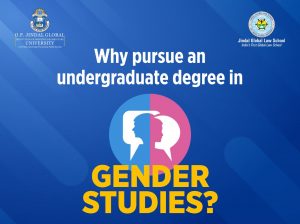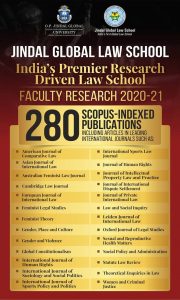The National Survey

The Student Experience in the Research University (SERU), a Consortium of Research Universities at the University of California, Berkeley, developed the SERU COVID-19 survey to analyse and understand the impact of the pandemic on the student experience.
Following the initiative, the Research Centre for Comparative and Global Education, under the aegis of the IIHEd, JGU, sought to conduct the same survey in India in collaboration with the Association of Indian Universities (AIU).
The SERU survey questionnaire was adapted and customised to suit the context of India. The survey was administered at universities and other institutions of higher education across the country.
The objective of the SERU COVID-19 survey was designed to assess student experiences during the pandemic in the following five areas:
1) Students’ transition to remote instruction;
2) The financial impact of Covid-19 on students;
3) Students’ health and well-being during the pandemic;
4) Students’ sense of belonging and engagement; and
5) Students’ graduation and future plans.
The survey questionnaire was mailed to around 850 member universities of AIU and around 1800 colleges. Here is a copy of the letter sent by AIU to the Vice-Chancellors of Universities: https://www.spav.ac.in/2020/pdf/Survey%20on%20Student.pdf A total of 38 universities participated in the survey, out of which 4 were Central Universities, 20 were State Public Universities and 14 were State Private Universities. There were a total of 7688 responses from these 3 kinds of universities that are members of the AIU and accredited by the National Assessment and Accreditation Council (NAAC).
A report based on the national survey was jointly prepared by IIHEd faculty at JGU and the research division of the Association of Indian Universities (AIU). It was released virtually on 30 March, 2022 by Prof. (Dr.) C. Raj Kumar, Director, International Institute for Higher Education Research and Capacity Building (IIHEd) & Founding Vice Chancellor, JGU.
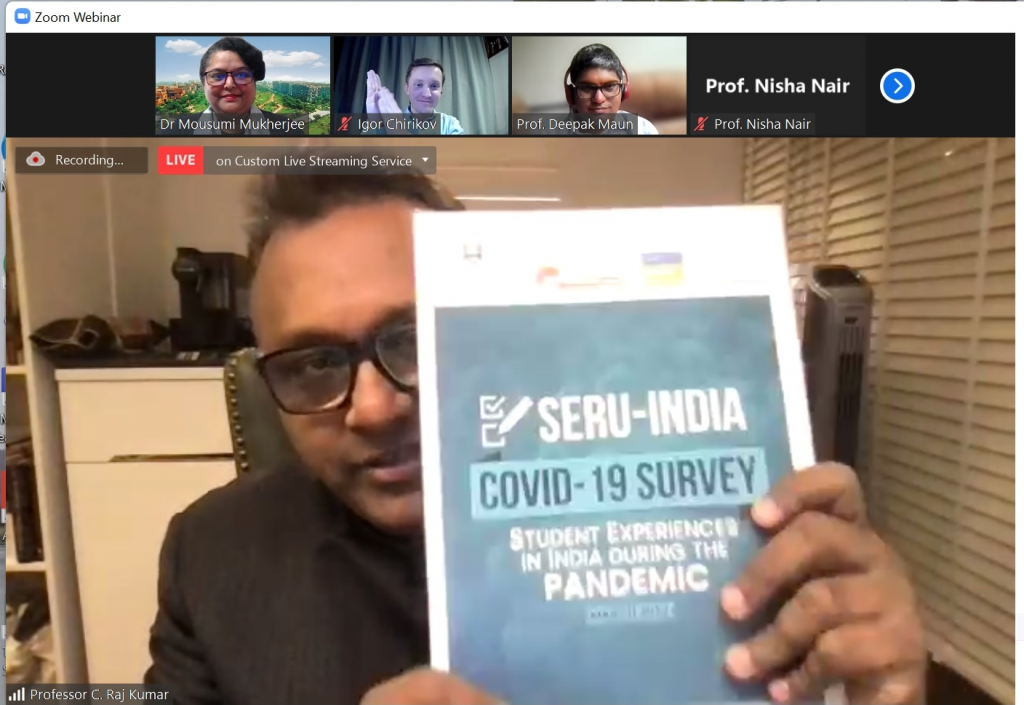
Findings & Recommendations
One of the interesting findings from the online survey is the sample of students, who took the survey. The survey findings mostly represent a sample of middleclass aspirational Indian students, who had access to digital technology in the middle of the COVID-19 pandemic and campus lockdown. Only 2.4% belonged to the wealthy section of society, and only 12% said that they belonged to the working class or lower income group. This is the major limitation of the survey.
It is understandable that the poor and working-class students could not participate in the survey because of the deep digital divide. But there is no evidence to explain why only 2.4% wealthy students participated in the survey.
The analysis of the survey provides some important findings about the student experiences. Here are some of them:
- The female and third gender students adapted well to the online transition compared to their male counterparts.
- There were no significant differences across the socio-economic status of the respondents in their adaptation to online teaching and learning.
- Lack of interaction and communication with peers in the classroom was found to be the most important obstacle faced by students during online classes.
- Students from private universities appeared to be more satisfied with management strategies adopted by their institutions in response to the COVID-19 pandemic compared to students from central and state-public universities.
- Across all the socio-economic classes, the students who took the survey have faced mental health and financial challenges.
The major recommendations based on the main survey findings are:
- Diverse approaches need to be followed to gather pan-India survey data about student experiences, rather than just an online survey, which restricts the sample size and rate of responses.
- Universities need to focus on re-designing their courses to meet the requirements of online teaching, learning, and research.
- The faculty and administration need to provide greater support to students, especially when the classes are completely online during emergencies and campus lockdowns following the COVID-19 pandemic.
- Universities need to build a corpus of emergency crisis management funds to support students during similar emergencies in the future. This could be funded from CSR investment for both private and public universities.
- Funding organisations, irrespective of government, private, or philanthropic, should be geared up to help universities by providing support without many bureaucratic or procedural impediments.
- Irrespective of the socioeconomic and gender backgrounds of students, universities need to develop a robust service for the mental health and well-being of students. Post-pandemic Universities need to work closely with the public healthcare sector.
In the special address during the report release event, Professor Kumar said, “Covid-19 has challenged our assumptions to rethink our teaching and learning, research, and university administration. Students are the main stakeholders of HEIs. It is important to systematically monitor the student experiences at HEIs to meet their learning, social, and emotional needs. In order to improve the quality of our HEIs, it is very important to improve the quality of the experiences that our students have at our institutions”.
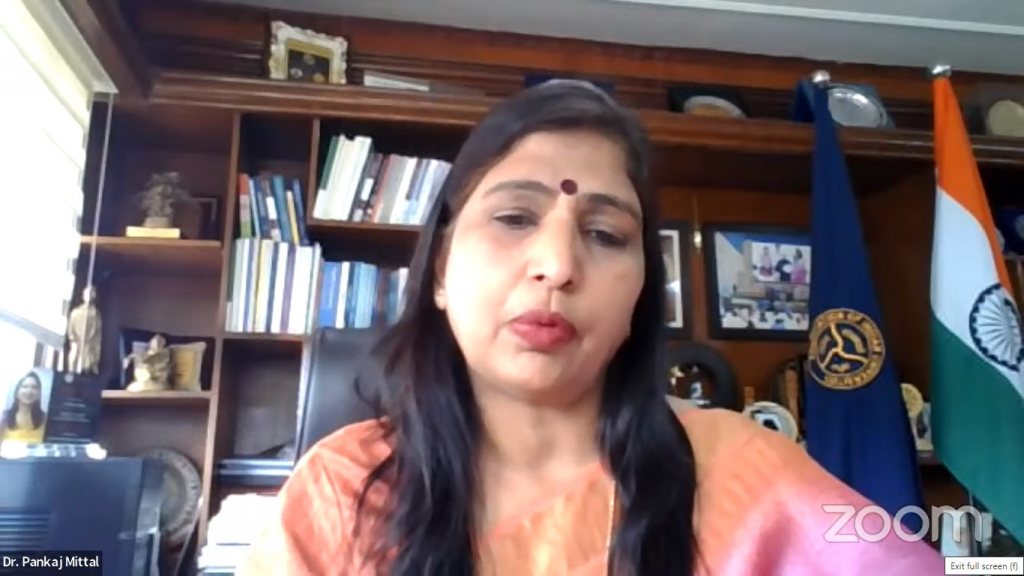
Dr. Mittal also emphasised how student experiences play an important role in enhancing the quality of education in HEIs, and it is important to conduct these kinds of surveys every year. During her speech, she also spoke about two other reports that were developed together by AIU and JGU, the NEP 2020 Implementation Document and the Covid-19 Toolkit, and how they were used by many universities in India as a guide.
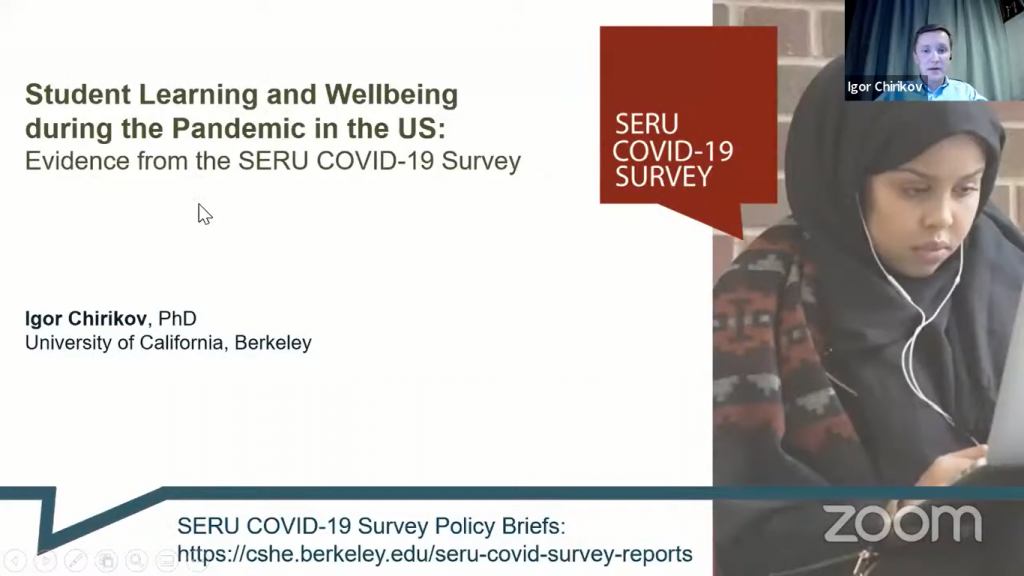
Dr. Chirikov explained the work of the SERU consortium and the kind of work that the consortium does in the USA, specifically about the findings of the SERU survey in the US. The SERU Consortium regularly runs a survey at ten large public universities in the US to record and analyse student experiences to inform institutional policies. Even in the middle of the pandemic, they received around 50,000 responses, including undergraduate, graduate, and professional students, which is indeed a large and good sample size for the survey. Issues related to mental health challenges of students came to the forefront in the US survey.
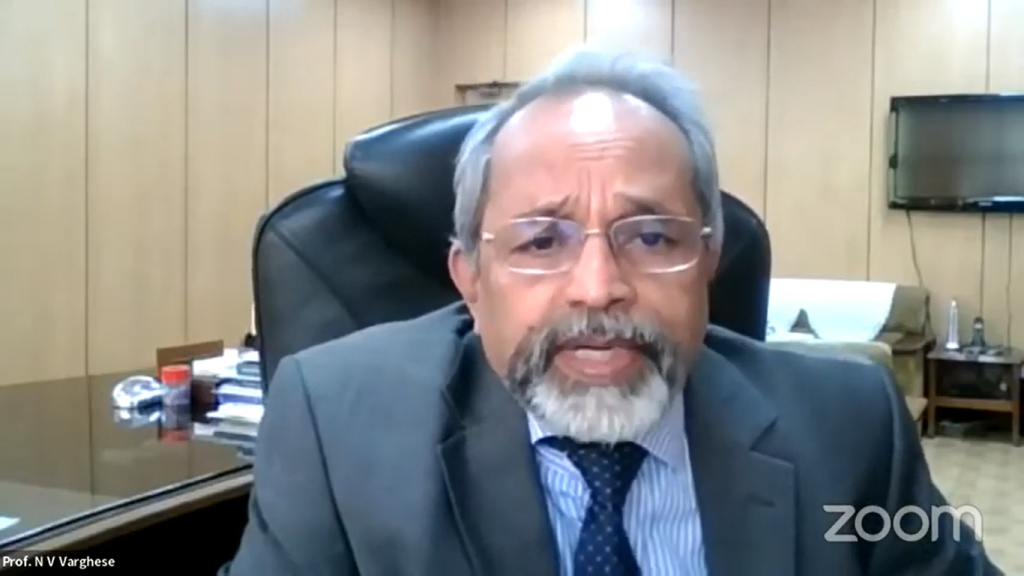
During the discussion about the responses received for the SERU-India COVID-19 survey, Professor Varghese said the survey report has brought forward important findings, which needs further multivariate analysis, despite limitations of the data demographics. He further stated that since survey responses are generally quite low in India compared to the US, the SERU-INDIA COVID-19 survey did get a large enough sample of over 7000 responses for the report to be considered authoritative.
Click here to read the report online: Student Experiences in Research Universities (SERU) – India COVID-19 Survey’
Watch the launch event LIVE on YoutTube: https://youtu.be/keFXnOa7kqI

